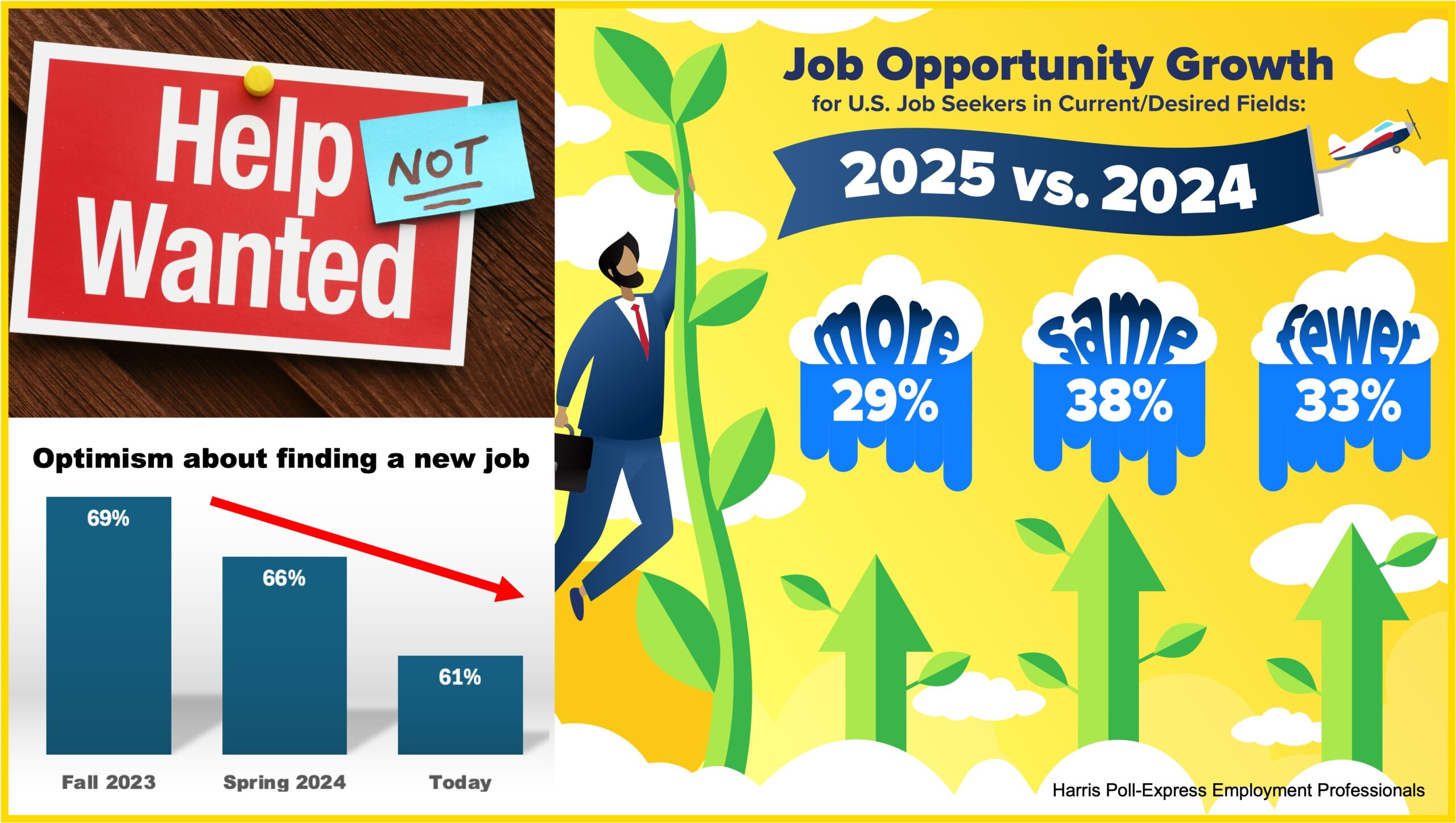Weekly Data
WHAT THE DATA SAY: Job-seeker optimism falls to lowest level in two years
By: Ray Day
CONTACT:
We wanted to share our latest consumer and business insights, based on research from Stagwell. Among the highlights of our weekly consumer sentiment tracking:

HELP NOT WANTED
A third of job seekers expect a decline in job offerings this year, based on our Harris Poll research with Express Employment Professionals.
- 61% of job seekers believe they will find a new job within six months, lower than 66% in the spring of 2024 and significantly lower than 69% in the fall of 2023.
- Employed job seekers are primarily looking for better compensation (40%), growth opportunities (38%) and improved work-life balance (33%).
- Female job seekers are more likely than their male counterparts to look for better compensation (46% versus 36% for men) and work-life balance (39% versus 29% for men).
- Most job seekers are open to full-time positions (79%), with fewer willing to accept part-time (35%), contract/freelance (24%), temporary/seasonal (19%) or entry-level positions (18%).
- The most significant challenges for job seekers include finding opportunities that match their qualifications (51%), securing jobs with the pay they need to cover basic expenses (44%) and standing out in a competitive market (40%).
- The top barriers to employment are lacking hard skills, soft or communication skills (40%); companies claiming to be hiring but only collecting applicants/resumes to review (34%); and being underqualified (23%).
TECH REPUTATION STRENGTHENS
The tech sector begins 2025 with one of the strongest reputations across industries, and two thirds of Americans want tech companies to work with the incoming Trump administration, according to a HarrisX survey released by Stagwell’s Risk and Reputation Unit at CES 2025.
- 81% view the tech industry favorably, placing it on par with the manufacturing sector (80%) and far ahead of healthcare (65%), oil and gas (60%), pharmaceutical (52%) and the news media (51%).
- 79% say tech has a positive economic impact, and 57% expect the industry to be a major economic driver during the next five years.
- By comparison, one in three Americans think the real estate (35%) and auto (32%) industries will play a major role in the economy during that same time period.
- 67% want tech companies to work with the incoming Trump administration.
- 58% believe the Trump presidency will provide a boost for the technology industry.
- Yet Americans are less certain about the role tech leaders should play outside their industry: 55% say tech CEOs are not speaking up enough, and 60% think tech leaders “get it wrong” when they speak up on political, economic and social issues.
- When it comes to speaking out overall, workplace and economic issues are the safest topics: paid family leave (68%), minimum wage (66%) and the environment (65%). That compares with far fewer who favor companies speaking out on abortion (39%) or transgender rights (38%).
AI IS AGAIN THE STORY AT CES
AI is now central to product and service innovation, from tractors that optimize soil conditions to AI book-scanning voice readings, according to the Harris Poll team members on site at CES 2025.
- This year marks brands humanizing and integrating AI into daily life – and the race is on for competing visions to enhance brand-consumer relationships.
- We found 10 items of interest at CES.
- See also: Watch Stagwell’s CEO Mark Penn interview Elon Musk at CES!
- See also: The Real Questions Leaders Should Ask During (And After) CES
CYBER IS THIS YEAR’S TOP C-SUITE CONCERN
Cybersecurity and technology disruption – often caused by AI manipulation – are among the top threats to business in 2025, based on our Harris Poll survey with Chubb.
- 74% of executives at large companies cite cybersecurity as the top risk to growth, with 40% reporting that cyber breaches and data leaks have been the most disruptive and financially burdensome man-made threats.
- That compares with 59% of executives citing cash flow and 56% pointing to inflation and interest rates as significant obstacles to growth.
WOMEN WANT BETTER OB/GYN CARE
Women in the U.S. are delaying gynecology visits and pushing for greater convenience, comfort and ease from healthcare providers, based on our Harris Poll survey with BD.
- 72% of women have delayed having a gynecology visit.
- That’s despite 62% of women understanding that cervical cancer is preventable with regular screenings.
- Women are skipping due to fear or discomfort (54%), scheduling-related challenges (49%) and lack of understanding on how often they should be screened (50%).
- 81% want more comfortable and less invasive HPV/cervical cancer testing options, with 73% interested in a self-collection swab test.
ICYMI:
In case you missed it, check out the thought-leadership and happenings around Stagwell making news:
- PRSA Member Mondays: “Communicating in 2025 and How to Navigate the Year Ahead”
- UnitedHealthcare CEO’s death could change corporate comms
- Healthcare consumers trust insurer AI tools, want more support: survey
- Gen Z’s Sriracha fandom skyrockets amidst a serious hot chili sauce shortage
- Paddington’s popularity surges among UK adults after new movie release
Related
Articles
In the News, Press Releases, Thought Leadership
Jun 10, 2025
Stagwell (STGW) Chairman and CEO Mark Penn to Discuss the Irreplaceable Power of Human Creativity on the Main Stage of Cannes Lions

Events, In the News, Press Releases, Talent & Awards
Jun 05, 2025
Code and Theory Named ANA B2B Agency of the Year After Transforming the World’s Leading Brands

In the News, Press Releases, Talent & Awards
May 19, 2025
Stagwell (STGW) Appoints Connie Chan as Chief Growth Officer for Asia Pacific





